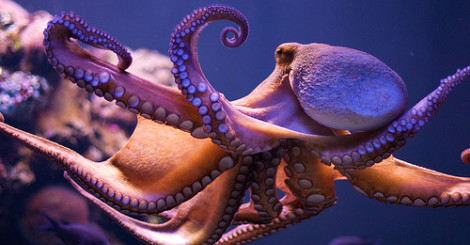

It’s been a while since we had some real science news in this space. My favorite recent story is the sequencing of the octopus genome. I’ve shared previously my fascination with ants; octopuses (not octopi, as it turns out, since octopus is Greek, not Latin) are rapidly joining them among my favorites. Did you know that octopus tentacles are capable of independent sensory processing, even if they are severed? The genome sequence reveals a number of interesting genes involved in nerve cell function, including genes not seen in vertebrates. There’s lots to learn there for sure.
I like to think of genomes as a kind of record of the work God has been doing on Earth since the beginning of life. Each genome we sequence reveals a little more of what God has been up to. This octopus genome is one of our first looks at what God has been doing in the depths of the oceans. Who knows what else we’ll learn as we explore down there?
Speaking of learning, I’d like to learn more about my readers so I can better serve you. I’ve created the following survey, and I’d greatly appreciate it if you’d complete it. As an extra incentive, we are offering prizes to 5 randomly selected respondents. Each of the 5 winners will receive their choice of 1 of the following books:
- Mapping Your Academic Career: Charting the Course of a Professor’s Life by Gary Burge
- Mapping the Origins Debate: Six Models of the Beginning of Everything by Gerald Rau
- Minds, Brains, Souls and Gods: A Conversation on Faith, Psychology and Neuroscience by Malcolm Jeeves
- Science & Its Limits: The Natural Sciences in Christian Perspective by Del Ratzsch
In addition, I will write blog posts answering one question from each of the 5 winners. Have a question you’ve always wanted to ask a scientist? Now’s your chance! And if I don’t think I have a good answer, I’ll do my best to recruit a guest who does. There’s a spot on the survey form below to submit your question. I also reserve the right to answer other submitted questions that I find interesting.
The contest will be open for 4 weeks; to be eligible for a prize, entries must be received before midnight EDT on the night of Wednesday, September 16. An e-mail address is required for the contest, just so we can contact the winners; e-mail addresses will not be used for any other purpose. Winners will be chosen randomly from all responses received by the deadline.
Thanks in advance for your honest feedback!
Next week I’ll be answering a question submitted by the American Scientific Affiliation‘s new Nexus forum:
I just changed positions from teaching at a university to a lab position at a biotech company. I’m struggling to adjust to the industry environment. What are the biggest changes in my thinking, approach to work, and job expectations I need to make?
Loading…
Andy has worn many hats in his life. He knows this is a dreadfully clichéd notion, but since it is also literally true he uses it anyway. Among his current metaphorical hats: husband of one wife, father of two teenagers, reader of science fiction and science fact, enthusiast of contemporary symphonic music, and chief science officer. Previous metaphorical hats include: comp bio postdoc, molecular biology grad student, InterVarsity chapter president (that one came with a literal hat), music store clerk, house painter, and mosquito trapper. Among his more unique literal hats: British bobby, captain’s hats (of varying levels of authenticity) of several specific vessels, a deerstalker from 221B Baker St, and a railroad engineer’s cap. His monthly Science in Review is drawn from his weekly Science Corner posts — Wednesdays, 8am (Eastern) on the Emerging Scholars Network Blog. His book Faith across the Multiverse is available from Hendrickson.

Leave a Reply